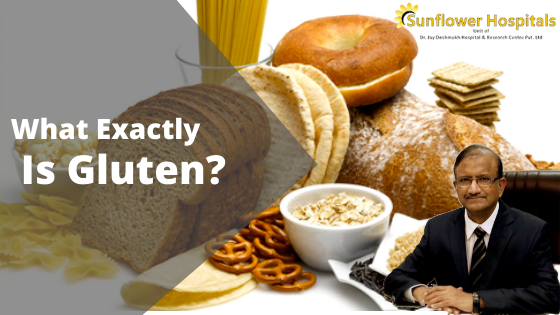
Why do restaurant menu cards mention about your gluten sensitivity?
Dr Jay Deshmukh: Gluten is a protein that is predominantly present in wheat. It is a sticky substance composed of the proteins gliadin and glutenin. Some individuals are allergic to these proteins. This allergy causes abdominal cramps, recurrent stools that are foul-smelling or oily. Hence if you have gluten sensitivity, you need to avoid food items containing gluten.
How to diagnose and confirm gluten sensitivity?
- A simple blood test that detects the presence of antibodies known as anti-tissue transglutaminase immunoglobulin A is a reliable test. By doing an upper gastrointestinal endoscopy and doing a biopsy of the upper intestine, the diagnosis can be confirmed.
What is Celiac disease?
- Celiac disease is an autoimmune disorder that is triggered when you eat gluten. It is also known as celiac sprue, non-tropical sprue, or gluten – sensitivity enteropathy.
What are the symptoms in adults?
- Abdominal cramps, loose stools, abdominal distension and associated unexplained weight loss and low haemoglobin should put you on alert. The other common symptoms include iron deficiency, bone or joint pain, arthritis, depression or anxiety, tingling numbness in hands and feet, seizures, irregular menstrual periods, itchy skin, and oral ulcers. In children growth problems, weight loss, chronic diarrhoea, vomiting, abdominal bloating and pain, fatigue, irritability and failure to thrive. All these are due to malabsorption of essential nutrients.
In which conditions a gluten-free diet is indicated?
Dr Jay Deshmukh: The gluten-free diet is indicated in managing the symptoms of certain medical conditions. In Celiac disease, gluten triggers immune system activity that damages the lining of the small intestine. The damage prevents the absorption of nutrients from food. Not- celiac gluten sensitivity includes abdominal pain, bloating, diarrhoea, constipation, foggy brain, rash or headache. Gluten ataxia affects certain nerve tissues and can affect muscle control.
What are the diet details in gluten-sensitive individuals?
- Fresh foods like fruits and vegetables, beans, seeds and nuts in their unprocessed form, eggs, fish and poultry and most low-fat dairy products are allowed. Grains like rice, millet, flax, arrowroot, corn and gluten-free diet that includes rice, soy, corn, potato, a bean can be used freely.
What are the grains that are not allowed?
- Avoid all foods and drinks containing wheat, barley, rye, triticale and oats in some cases. Unless labelled as gluten-free avoid beer, bread, cakes and pies, candies, cereals, French fries, gravies, portions of pasta, salad dressings, potato chips and vegetables in sauce.

